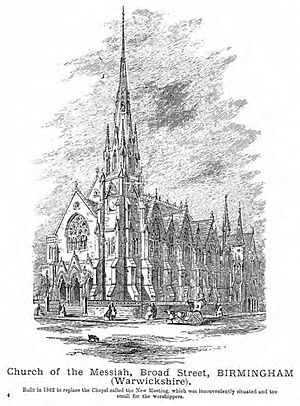Church of the Messiah, Birmingham facts for kids
Quick facts for kids Church of the Messiah |
|
|---|---|

Former Church of the Messiah, Broad Street, Birmingham.
|
|
| 52°28′41″N 1°54′40″W / 52.47792°N 1.91102°W | |
| Location | Broad Street, Birmingham |
| Country | England |
| Denomination | Unitarian |
| Architecture | |
| Architect(s) | John Jones Bateman |
| Groundbreaking | 1860 |
| Completed | 1862 |
| Construction cost | £10,000 |
| Demolished | 1978 |
| Specifications | |
| Capacity | 950 people |
| Length | 106 feet (32 m) |
| Width | 65 feet (20 m) |
| Height | 150 feet (46 m) |
The Church of the Messiah, Birmingham was a special church in Birmingham, England. It was a Unitarian place of worship located on Broad Street. This beautiful Victorian Gothic church was built a long time ago, between 1860 and 1862. It was quite unique because it was built right over the Birmingham Canal!
The people who worshipped here, called the congregation, had been meeting together for a very long time, even before this church was built. The building itself was taken down in 1978, but the congregation continued to meet. Many important people, including politicians, attended services at this church.
Contents
History of the Church
Early Beginnings
The story of this church's congregation started way back in 1692. That's when their very first meeting house was built. It was known as the Lower Meeting House in a place called Deritend.
By 1732, the group had grown too big for their first building. So, they moved to a new chapel on Moor Street.
Building the New Church
By the 1860s, the Moor Street chapel was also too small. The congregation needed an even bigger church. They decided to sell the Moor Street chapel to a Roman Catholic group, and it became St Michael's Church.
The new Church of the Messiah was designed by an architect named John Jones Bateman. The builders were George Branson and Edwin Gwyther. The first stone was laid on August 11, 1860. The church officially opened on January 1, 1862. It cost about £10,000 to build, which was a lot of money back then!
A Unique Location
The church's location was very unusual. It was built right over the Birmingham Canal. It actually formed part of the Broad Street canal tunnel. Imagine a church built on top of a waterway!
Famous Worshippers
Many notable people were part of this church's congregation. This included members of the Martineau family. They were very important in Birmingham and many of them became the city's Lord Mayors over the years. Samuel Carter, a Member of Parliament, also attended.
Later, Joseph Chamberlain and his son, Neville Chamberlain, also worshipped here. Neville Chamberlain later became the Prime Minister of the United Kingdom from 1937 to 1940.
Moving On
The congregation eventually moved to a new building. This new place was specially built for them at Five Ways in 1973. The original Church of the Messiah building was then demolished in 1978.
The Church Organ
A large musical instrument called an organ was first installed in the church in 1862. It was made by a company called Nicholson of Worcester.
However, by 1882, the church decided to get a new, bigger organ. This one was built by William Hill and Son and cost £1571. Later, in 1923, Nicholson's company rebuilt this organ. You can find details about this organ on the National Pipe Organ Register.
Some old newspapers suggest that the very first organ from 1862 was built by Halmshaw and Sons. They then tried to sell an even older organ from the Moor Street Chapel.
Ministers of the Church
Ministers are the leaders who guide the church services and congregation. Here are some of the ministers who served the Church of the Messiah:
- John Sillitoe, 1692–1704
- Thomas Pickard, 1705–1747
- Samuel Bourn, 1732–1754
- Samuel Blyth, 1747–1791
- William Hawkes, 1754–1780
- Joseph Priestley, 1780–1791
- John Edwards, 1791–1802
- David Jones, 1792–1795
- John Kentish, 1803–1853
- Joshua Toulmin, 1804–1815
- James Yates, 1817–1826
- John Reynell Wreford, 1826–1831
- Samuel Bache, 1832–1868
- Henry William Crosskey, 1869–1893
- Lawrence Pearsall Jacks, 1894–1903
- John Worsley Austin, 1903–????
Organists of the Church
Organists are the musicians who play the organ during services.
- John Gilbert Mills, around 1923
 | Precious Adams |
 | Lauren Anderson |
 | Janet Collins |

